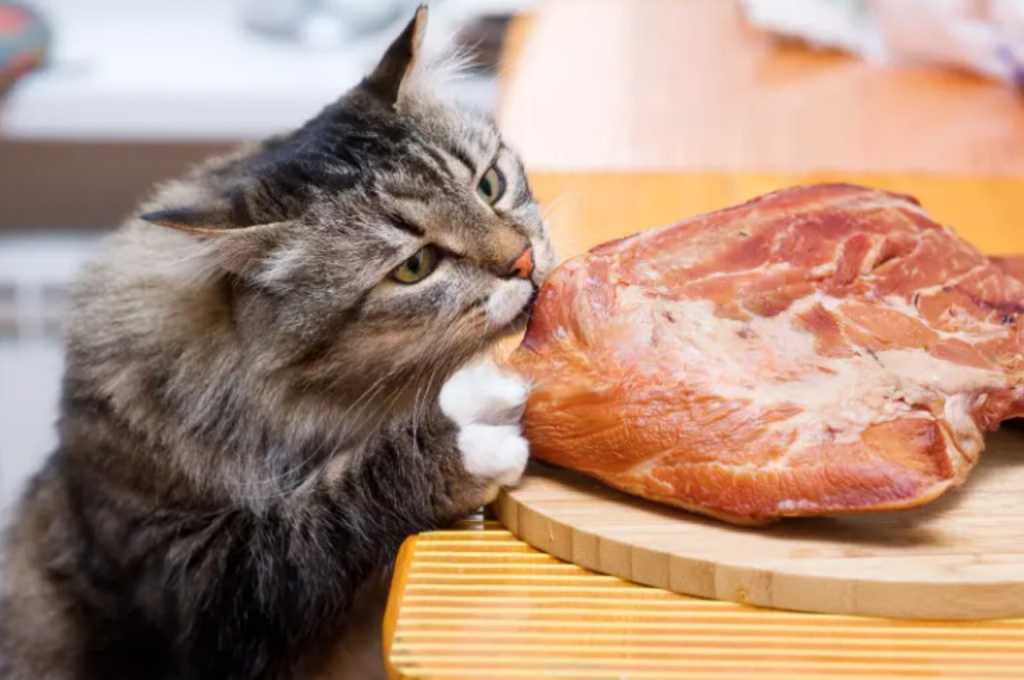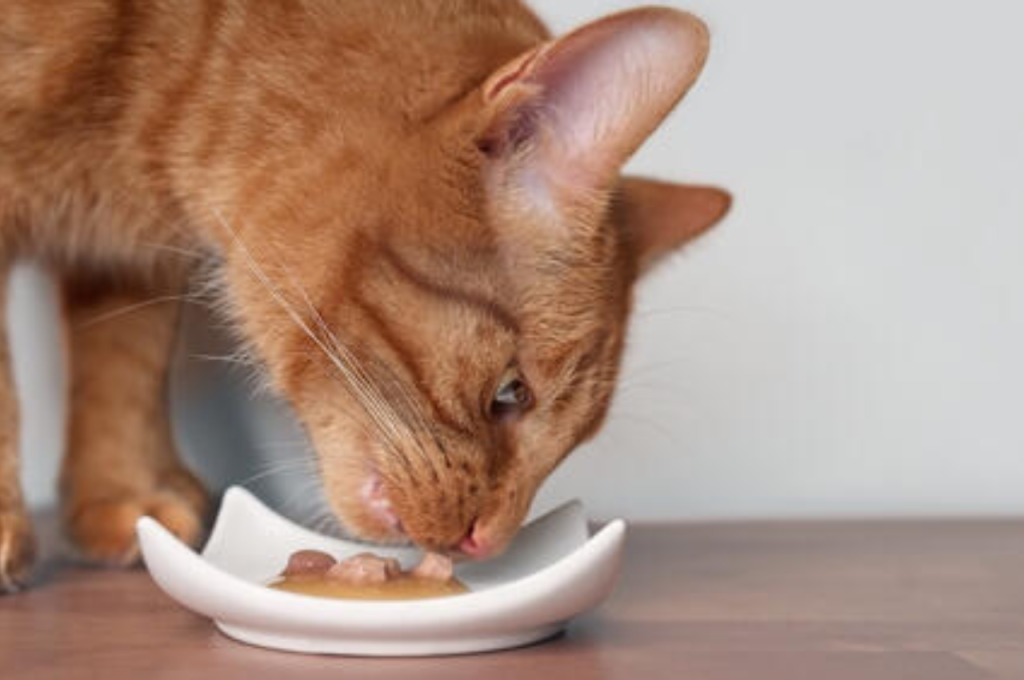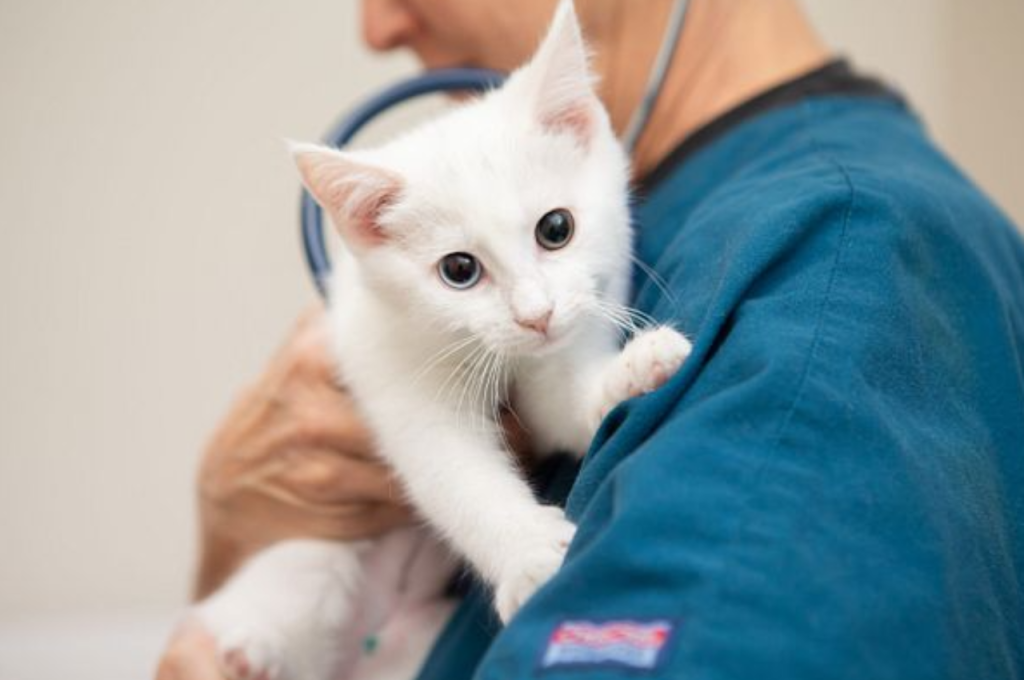Yes, cats can eat pork in moderation. However, it should not be a regular part of their diet due to its high fat content.
Pork can be given as an occasional treat to your cat, but should not replace their balanced diet of protein-rich cat food. Cats require a diet that is high in animal protein, so it is essential to provide them with cat-specific foods that meet their nutritional needs.
Always ensure that the pork is cooked thoroughly and free from any seasonings or additives that may be harmful to your feline friend. Moderation and balance are key when it comes to incorporating pork into your cat’s diet.
Can Cats Eat Pork?
Cats can eat small amounts of pork as an occasional treat, but it should not be a regular part of their diet. Pork can be high in fat and may not provide the necessary nutrients for your cat’s health.

Risks of Feeding Pork to Cats
Feeding pork to cats can lead to digestive upset, pancreatitis, or even obesity due to the high-fat content in pork.
Digestive System of Cats
Cats have a sensitive digestive system that may not be able to handle certain foods like pork, especially in large quantities.
Problems With Feeding Uncooked Pork
Uncooked pork can contain harmful bacteria such as salmonella or parasites that can make your cat sick if consumed.
Can Cats Eat Cooked Pork?
Cats can eat cooked pork in moderation, but it is important to avoid seasonings, spices, or excessive salt that may be harmful to your cat.
Safe Alternatives to Pork for Cats
- Safe alternatives to pork for cats include lean proteins such as chicken, turkey, or fish which are healthier options for your feline friend.
- Consult your veterinarian before introducing any new food to your cat’s diet to ensure it is safe and appropriate for their nutritional needs.
Understanding A Cat’s Nutritional Needs
Cats are unique animals with specific dietary requirements that differ from humans and other pets. “Understanding a Cat’s Nutritional Needs” is essential for ensuring their overall health and well-being. Here are the key aspects to consider:
Carnivorous Diet of Cats
Cats are obligate carnivores, meaning their diet should primarily consist of animal-based proteins. Meat is the main source of nutrients for cats, providing them with essential amino acids that support their physiological functions.
Importance of Protein
Protein is crucial for cats’ muscle development, immune system function, and energy production. A diet rich in high-quality proteins is vital for their health and overall vitality.
Vitamins and Minerals for Cats
Cats require specific vitamins and minerals to support various bodily functions. Vitamins A, B, D, and E are essential, along with minerals like calcium, phosphorus, and potassium to maintain their health.
Water Intake for Cats
Water is a critical component of a cat’s diet, supporting their hydration, digestion, and overall well-being. Cats have a low thirst drive, so ensuring they have access to fresh water at all times is essential.
Feeding A Balanced Diet to Your Cat
Providing a balanced diet is essential for your cat’s overall health and well-being. While cats are carnivores by nature, their nutritional needs can vary. It’s important to ensure that your feline friend receives the right nutrients in the correct proportions. When it comes to feeding your cat, it’s common to wonder if certain foods are safe and suitable. In this blog post, we will explore the topic of feeding pork to your cat and discuss various options for maintaining a well-rounded diet.
Commercial Cat Food Options
When it comes to convenience and guaranteeing the right balance of nutrients, commercial cat food is a reliable choice. Available in various forms like dry kibble or wet cans, these products undergo rigorous testing to ensure they meet the dietary requirements of cats. Look for cat food brands that boast a high protein content and include essential vitamins and minerals. It’s best to opt for a premium brand formulated specifically for your cat’s life stage, whether they are kittens, adults, or seniors.
Reading Cat Food Labels
Reading labels is crucial to understanding what you’re feeding your cat. The ingredient list and nutritional information reveal valuable insights into the product’s quality. Look for a reputable brand that lists a named protein source as the main ingredient, such as chicken or fish. Avoid cat foods that contain fillers, artificial preservatives, or excessive carbohydrates. Also, ensure that taurine, an essential amino acid for cats, is included as a supplement in the food.
Homemade Cat Food Recipes
If you prefer a more hands-on approach, creating homemade cat food allows you to have full control over the ingredients and nutrients your cat consumes. However, it’s vital to consult with your veterinarian or a veterinary nutritionist before embarking on a homemade diet. They can guide you in formulating recipes that meet your cat’s specific dietary requirements. Homemade cat food typically includes a combination of protein sources like lean meats, such as chicken or turkey, and specific supplements to ensure nutritional balance.
Supplements for Cats
In addition to their primary diet, some cats may require supplements to address specific health concerns or ensure adequate intake of essential nutrients. Common supplements for cats include omega-3 fatty acids, which promote healthy skin and coat, and probiotics, which aid in digestion. However, it’s essential to consult with your veterinarian before introducing any supplements to your cat’s diet. They can determine if supplementation is necessary and guide appropriate dosage.
Common Human Foods that are Unsafe for Cats
As a cat owner, it’s essential to be aware of which human foods are unsafe for your feline friend. While cats may beg for a taste of your food, many common human foods can be harmful or even toxic to them. Here are some foods to avoid feeding your cat:

Foods Toxic to Cats
Cats can be curious creatures, often showing interest in what their owners are eating. However, not all common human foods are safe for cats to consume. It’s important to be aware of the potential risks associated with certain foods to ensure the health and well-being of your feline companion. While pork is not inherently toxic to cats, there are a few considerations to keep in mind when it comes to incorporating it into their diet.
Common Seasonings Harmful to Cats
When cooking pork or any other human foods for your cat, it’s essential to be cautious of the seasonings used. Common seasonings such as garlic, onion, and certain herbs can be harmful to cats when consumed in significant quantities. These seasonings can lead to digestive issues and even toxicity for cats, so it’s best to avoid adding them to any treats or meals intended for your feline friend.
Giving Treats to Cats
When offering treats to cats, it’s crucial to select options that are specifically designed for feline consumption. While it may be tempting to share human food with your cat, it’s important to remember that their dietary needs differ from ours. Opt for treats that are formulated to meet a cat’s nutritional requirements, and always check with a veterinarian if you are unsure about the safety of a particular food item.
Introducing New Foods to Your Cat
Wondering if pork is safe for your cat? Introducing new foods to your cat, like pork, should be done in moderation. Consult with a veterinarian to ensure it fits your cat’s dietary needs.
The Importance of A Gradual Transition
Cats may not be big fans of change, especially when it comes to their diet. It’s crucial to introduce new foods to your cat gradually. Abrupt changes can upset their stomach and lead to digestive issues. Gradually transitioning your cat to pork or any new food allows their digestive system to adapt, reducing the risk of gastrointestinal upset.
Signs of Food Allergies
It’s essential to monitor your cat for signs of food allergies when introducing new foods. Watch for symptoms such as itching, skin rashes, vomiting, or diarrhea. If your cat exhibits any of these signs after consuming pork, it’s best to consult a veterinarian to rule out potential food allergies.
Food Variety for Cats
Offering a variety of foods is beneficial for cats as it provides them with essential nutrients from different sources. Introducing pork into their diet, alongside other protein sources, can contribute to a well-rounded diet. However, it’s important to ensure that pork is cooked thoroughly to eliminate the risk of parasites and bacteria.
Monitoring Your Cat’s Reaction
After introducing pork to your cat’s diet, carefully observe their reaction. Look for signs of enjoyment, changes in appetite, or any adverse reactions. If your cat tolerates pork well and shows no adverse effects, it can be included as part of their balanced diet. Always keep an eye on your cat’s behavior and health when introducing any new food items.
Recognizing Signs of A Healthy Cat
Keeping your cat healthy is essential for its overall well-being. As a responsible pet owner, it’s crucial to be aware of the signs that indicate your feline friend is in good health. By recognizing these signs, you can ensure that your cat receives the care it needs. In this article, we will discuss the main indicators of a healthy cat, focusing on optimal weight and body condition, healthy coat and skin, normal eating and drinking habits, and regular bowel movements.
Optimal Weight and Body Condition
Ensuring your cat maintains an optimal weight and body condition is vital to its health. A healthy weight helps prevent various medical conditions such as diabetes, arthritis, and heart disease. To determine if your cat is at an ideal weight, you can use a body condition scoring system developed by veterinarians.
The body condition scoring system evaluates your cat’s body fat distribution, palpable ribs, and overall physique. An ideal weight is usually characterized by a cat having a visible waist behind the ribs when viewed from above and being able to feel the ribs with minimal fat covering. Overweight cats may have difficulty grooming themselves and may be at higher risk of developing obesity-related health problems.
Healthy Coat and Skin
The condition of your cat’s coat and skin is an excellent reflection of its overall health. A healthy cat will have a shiny, smooth, and lustrous coat. Their skin should be pliable and free from dryness, flakiness, or lesions. Regular grooming helps maintain a healthy coat and skin, stimulates blood flow, and promotes a glossy coat. Additionally, providing a balanced diet rich in essential nutrients, especially those beneficial for skin and coat health, can contribute to maintaining a vibrant appearance.
Normal Eating and Drinking Habits
Monitoring your cat’s eating and drinking habits is crucial for identifying any potential health issues. A healthy cat will have a good appetite and drink an appropriate amount of water throughout the day. While each cat’s appetite varies, it’s essential to observe any drastic changes in their eating habits. A sudden decrease or increase in appetite or a noticeable change in drinking behavior may indicate an underlying health problem.
If you notice any significant changes, it’s advisable to consult your veterinarian, as these alterations may be symptoms of various conditions such as dental issues, digestive problems, or kidney disease. Additionally, it’s important to ensure your cat has access to fresh water at all times to prevent dehydration.
Regular Bowel Movements
A healthy cat will have regular bowel movements that are neither excessively hard nor runny. The frequency of bowel movements may vary from cat to cat, but they should be consistent and formed. Changes in stool consistency, such as diarrhea or constipation, can indicate digestive problems or an improper diet. It’s essential to keep an eye on your cat’s litter box and promptly address any abnormalities in bowel movements to maintain their gastrointestinal health.
Overall, being aware of these indicators can help you monitor and maintain your cat’s health effectively. By paying attention to optimal weight and body condition, healthy coat and skin, normal eating and drinking habits, and regular bowel movements, you can ensure that your feline companion leads a healthy and happy life.
Consulting Your Veterinarian
If you suspect your cat has ingested any toxic foods or substances, it’s crucial to consult your veterinarian immediately. Time is of the essence when dealing with potential poisoning, and prompt medical attention can make a significant difference in your cat’s outcome.

When you contact your veterinarian or an emergency animal hospital, be prepared to provide them with as much information as possible, including:
Importance of Veterinary Advice
Always seek veterinary advice before introducing new foods like pork to your cat.
Questions to Ask Your Veterinarian
- Is pork safe for my cat?
- What are the potential risks of feeding pork?
- Are there specific portions that are safe?
Health Checkups for Cats
- Regular vet visits are crucial for your cat’s health.
- Discuss dietary changes and concerns with your vet.
Conclusion
While cats can eat small amounts of cooked pork, it should not be a regular part of their diet. Pork should be free from seasoning and bones, as they can be harmful to your feline friend. It is always best to consult with a veterinarian before introducing any new food into your cat’s diet.
Remember, their nutritional needs are different from ours, and it’s important to provide them with a balanced and appropriate diet to keep them healthy and happy.
